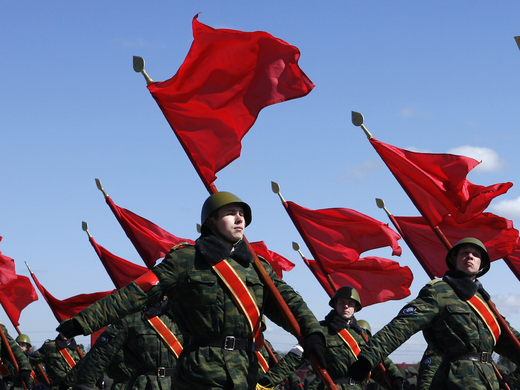I once taught a seminar at the National Defense Academy in Yokosuka—the closest thing Japan has to West Point. It is here that Japan trains its future military leaders. I began the class by going around the room and asking each of the cadets why they were there. These were the most common answers:
- “Because I wanted to learn a skill.”
- “Because it’s cheap.”
- “I couldn’t get into the university I really wanted to go to.”
- “It’s close to where I live.”
- “It’s far from where I live.”
- “My girlfriend works nearby.”
Finally, toward the very end, one lone student said, “Because I want to serve my country.”
So you can imagine my perplexity and bemusement when recent moves to loosen restrictions on the Japan Self Defense Forces — so that they could engage in collective self-defence — triggered hysterical warnings of a “return to militarism,” Prime Minister Shinzo Abe’s “Faustian flirtation with [the] specter of war,” his “thirst for military glory,” and his “connivance in the revival of the devilish militarism that once wrecked Asia.” Certainly none of this was on my cadets’ agenda.
Having travelled to Japan some 70 or 80 times over the course of the last three decades, I think I now have a pretty good feel for the place. Japan is the least militaristic country I know, with the possible exception of Iceland. So it naturally occurs to me to wonder how intelligent adults can buy this “resurgent Japanese militarism” canard.
It is possible that they don’t. It is possible that hysterical statements like this are designed to keep Japan on the defensive and to keep the world’s attention focused on Japan’s past — instead of, say, on China’s or Korea’s present. This is very dangerous. Such statements poison regional relations, increase tension and suspicion, frustrate cooperation, and at the end of the day may result in a shooting war that no one actually wants or expects. Deliberately fanning fears of Japanese militarism when you know them to be false is like shouting “Fire!” in a crowded movie theatre.
But what if these statements are sincere?
In the course of research for CIGI’s project on Confidence, Trust and Empathy in Asia-Pacific Security, we have noted that most of the hysteria focuses on Abe personally and on his putative “right-wing nationalist” fellow travelers. The charge is not that the Japanese people as a whole seek war, conquest or the return of the Greater East Asia Co-Prosperity Sphere, but that enough Japanese do to represent a real danger.
Every country has fringe groups, of course, and Japan is no exception. In Japan, these groups are more xenophobic than militarist. From time to time, in one of the major cities of Japan you might encounter one of their sound trucks draped with Japanese flags and banners that denounce the presence of foreigners or the U.S.-Japan Security Treaty. None of these groups calls for renewed military adventurism. (Political speech is well-protected in Japan, but since no one really likes having to listen to these people, municipal governments tend to issue them permits for times and places when few people are around to hear.)
In addition to being xenophobic, many on the far right in Japan hold views that neighbouring countries understandably find deeply offensive — for example, denying or minimizing the 1937 Nanjing Massacre or the wartime conscription of sexual slaves, or “comfort women,” by the Imperial Japanese Army. Morally speaking, of course, this falls into the same category as Holocaust denial. But it does not amount to advocating the reconquest of Asia.
What about Abe himself? It is safe to say that he is a proud Japanese. He chafes at Japan’s systematic postwar demonization; he clearly thinks that it is high time that the world moved on from the 1930s; he certainly believes that Japan has been unfairly singled out for bad behaviour in the past; and he has displayed some of the very same insensitivity that makes it easy for the fear mongers to associate him with more radical rightist views. But he has never said or done anything to indicate that he would like to rewind the clock 80 years.
Even if a Japanese prime minister had secret militarist desires, there is absolutely no prospect whatsoever that he or she could realize them. Japan is a sophisticated, well-functioning democracy with a weak executive, strong norms of civilian control, a professional military, and deeply embedded antiwar norms. The overwhelming majority of Japanese clearly believe that Japan should only use force in very narrow limited circumstances, and certainly not for offensive war. They disapprove both of collective self-defence and of Abe’s “reinterpreting” the constitution so as to permit what are, in the grand scheme of things, minor and perfectly sensible changes that still leave Japan operating under tighter constraints on the use of its military than any other country in the world.
On top of everything else, Japan already has one of the world’s oldest populations and will soon be too old to fight. Even if there were some magic overnight sea change in the Japanese gestalt, there wouldn’t be enough young men to fill the ranks. Retirees make for lousy conscripts.
So the whole idea is absurd. Anyone who genuinely fears a revival of Japanese militarism badly misunderstands Japanese politics and society.
This is a case where ignorance is even more dangerous than dishonesty. Sincere alarms about Japanese militarism have all of the same negative effects as tactical ones. But someone using the fear tactically is unlikely to feel any urgent need pre-empt it. Someone who believes it might.
It is time to put this groundless fear to rest, for everyone’s sake.
Next: James Manicom on the futility of good ideas in the South China Sea.


